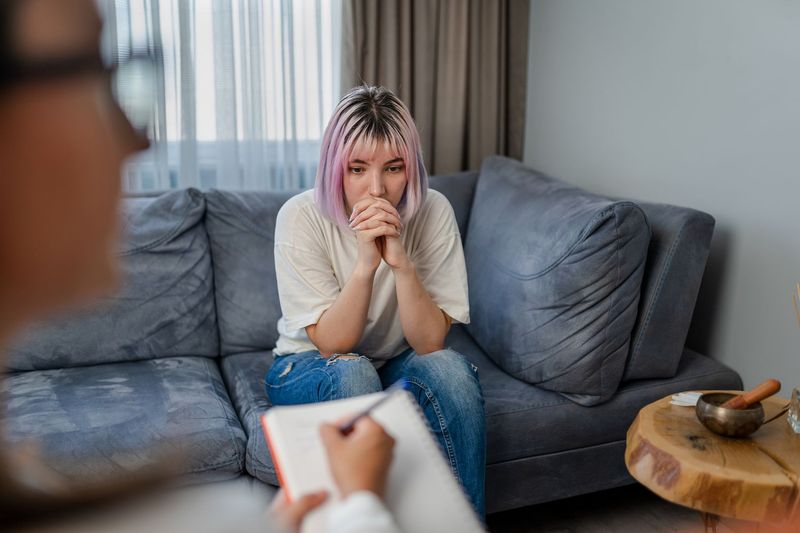Understanding the traits that may lead some women to allow mistreatment in relationships is crucial for fostering healthier connections. These traits can emerge from various emotional, psychological, or societal influences that create patterns of acceptance towards detrimental behaviors. By recognizing and addressing these characteristics, women can empower themselves to cultivate more respectful and fulfilling relationships.
1. Low Self-Esteem

Struggling with self-esteem can be like walking through a fog. For many women, low self-worth makes them vulnerable to accepting less than they deserve. This trait often stems from past experiences or constant negative feedback.
Such women may find themselves believing they aren’t worthy of love or respect. This belief can lead them to settle for partners who don’t treat them well, thinking they can’t do better.
Breaking free requires self-reflection and a willingness to challenge these internalized notions. External support from friends or professionals can also play a pivotal role.
2. Fear of Loneliness

The fear of being alone can be incredibly powerful. Women who are terrified of loneliness may stay in unhealthy relationships simply to avoid solitude. This fear can overshadow their ability to make sound decisions.
Often, the thought of facing the world without a partner seems more daunting than enduring mistreatment. This mentality can lead to staying in a relationship that is emotionally draining.
Building a sense of independence and self-reliance is key. Finding joy in personal interests and friendships can alleviate the fear of being alone.
3. Overly Compassionate Nature

An overly compassionate heart can sometimes become a burden. Women who possess this trait often put others’ needs above their own, even when it’s detrimental to them. They may believe they can “fix” their partner’s issues through love and patience.
However, this excessive empathy can lead to neglecting their own well-being as they focus entirely on their partner’s happiness. Such women might find themselves trapped in a cycle of giving without receiving.
Setting boundaries is essential. Learning to say “no” can be a powerful tool in maintaining a balanced relationship.
4. Past Trauma

Past traumas can cast long shadows. Women with unresolved trauma may find themselves repeating patterns of unhealthy relationships. These experiences can shape their understanding of love and acceptance.
For some, the chaos of a tumultuous relationship feels familiar, even if it’s harmful. This familiarity can be mistaken for normalcy, perpetuating cycles of mistreatment.
Healing requires courage and professional help is often vital. Through therapy and support, women can unravel these emotional knots and rebuild their perception of healthy relationships.
5. Desire for Approval

Seeking approval can be a slippery slope. Women who crave validation from others might compromise their own happiness for the sake of acceptance. This need can drive them to stay in detrimental relationships.
The desire to please can overshadow personal desires, leading to a loss of self-identity. They might alter their behavior, opinions, or even dreams to fit their partner’s expectations.
Finding self-worth independent of others’ opinions is liberating. Encouraging self-assurance and confidence can guide women towards more respectful relationships.
6. Idealization of Romance

The allure of fairy-tale romances can be misleading. Women who idealize romance might overlook red flags in their pursuit of a perfect relationship. This idealization can blind them to the realities of a partner’s behavior.
They often dream of transforming a flawed relationship into a happily-ever-after, even at their expense. The fantasy of love conquering all can encourage staying in unhealthy dynamics.
Grounding expectations in reality is essential. Embracing the imperfections of real-life relationships can prevent disappointment and emotional harm.
7. Codependency

Codependency can create a toxic bond. Women who are codependent often lose themselves in their partner’s life, prioritizing their partner’s needs over their own. This trait fosters an unhealthy reliance on the relationship.
They may equate their partner’s happiness with their own, sacrificing their well-being. This imbalance can lead to emotional exhaustion and a sense of entrapment.
Developing a strong sense of self is vital. Encouraging personal growth and independence can break the cycle of codependency, leading to healthier connections.
8. Lack of Boundaries

Boundaries define respect. Women lacking clear boundaries might allow partners to overstep, leading to mistreatment. This absence of limits can stem from fear of conflict or desire to be liked.
Without boundaries, they may tolerate behavior that chips away at their self-respect. The lack of personal limits often results in exhaustion and resentment.
Learning to establish and maintain boundaries is empowering. It involves understanding one’s worth and the courage to assert it, fostering healthier relationships.
9. Misinterpretation of Love

Misunderstanding the essence of love can lead to pain. Some women equate love with sacrifice or suffering, believing these elements are inherent to deep affection. This belief can keep them in harmful relationships.
They may endure mistreatment, thinking it’s a testament to their love’s strength. This confusion between love and endurance can trap them in a cycle of hurt.
Relearning what love truly means is crucial. Embracing a vision of love that includes mutual respect and joy can transform their relationship experiences.

